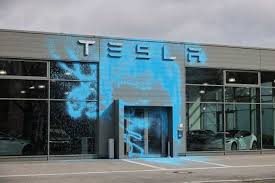Tesla investors are bracing themselves for a challenging start to the year as the electric carmaker readies to release data on first-quarter deliveries. Reports suggest that the company is expected to show a decline in sales compared to the same period last year, with analysts attributing this decrease to various factors, including a backlash against Tesla's CEO, Elon Musk.
On the horizon of first-quarter deliveries, industry experts predict significant headwinds for Tesla, with Dan Ives of Wedbush Securities forecasting a drop in deliveries to be around 7% lower than last year. This decline is partly linked to Musk's controversial ties to the Trump administration, which have stirred up negative sentiment around the Tesla brand. Ives highlighted that 30% of the anticipated drop in deliveries can be attributed to brand damage associated with Musk's involvement in the department of government efficiency, impacting consumer perception of the company.
Beyond Musk's political affiliations, other challenges facing Tesla in the first quarter of 2023 include consumer anticipation for updates to popular models like the Model Y, a critical player in Tesla's product lineup. The feedback loop from market demand is crucial for assessing future trends, as is evident in the company's fluctuations in consumer trust and interest.
As the electric car market continues to evolve, Matthias Schmidt, an electric car analyst, underlines the significance of Musk's image in influencing consumer decisions. Schmidt warns that Musk's association with polarizing figures and controversial policies hampers Tesla's appeal, particularly among its liberal consumer demographic.
The impact of Musk's reputation extends beyond domestic markets, with first-quarter delivery forecasts in western Europe also expected to reflect a downturn. The challenges faced by Tesla are not exclusive to the North American market but have reverberations on a global scale, emphasizing the interconnectedness of the automotive industry.
In addition to Musk's personal controversies, external factors like trade policies are adding complexity to Tesla's operational landscape. President Donald Trump's announcement of a 25% tariff on foreign-made cars has triggered concerns within the industry, with Tesla potentially facing repercussions despite its domestic manufacturing operations. The imposition of tariffs has the potential to disrupt pricing dynamics and supply chains, affecting not only Tesla but the broader auto industry as a whole.
Ives has warned that the global automotive sector could experience significant disruptions as a result of these tariffs, with implications for manufacturers worldwide. The uncertainty surrounding international trade policies adds another layer of complexity to Tesla's already challenging environment, creating additional obstacles for the company to navigate in the months ahead.
The evolving dynamics of the electric car market, combined with external economic and political factors, present a complex set of challenges for Tesla as it navigates through the first quarter of 2023. The upcoming delivery data will serve as a barometer for the company's performance and its ability to address the multifaceted issues impacting its operations and reputation in the eyes of consumers and investors alike.


